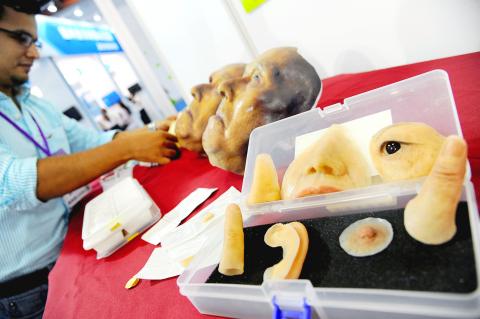Taiwan ranked as the world’s fourth-largest nanotechnology patent holder last year, an industry expert said at the opening of the Taiwan Nano Week and Exhibition yesterday at the Taipei World Trade Center.
Wu Chung-yu (吳重雨), head of the National Program on Nanotechnology, said that nanotechnology is expected to be a main driver for the technology industry.
The EU, the US, Germany, Japan and South Korea are mapping out plans for the development of nanotechnology by 2020, Wu said.

Photo: CNA
The National Program on Nanotechnology was initiated in 2003 and entered its second phase of implementation in 2009, with a budget of NT$14.6 billion (US$494.14 million), Wu said.
It has published 6,100 nanotechnology-related articles in international journals and won 1,500 patents, Wu said.
Nearly NT$14.5 billion has been invested in 860 nanotechnology transfer projects, 630 of which have been completed, Wu said, adding that an initiative for a brokerage of technology transfers has recently been launched to encourage innovation in the field.
Wu expressed hope that the industry’s production value could reach NT$1 trillion.
This year’s nanotechnology exhibition highlights a theme pavilion of nano-innovation for nanotechnology and products that include nanoelectronics and optoelectronics techniques, energy and environmental applications, instrument and equipment development, biomedical and agricultural applications, nanomaterials and traditional industry, nanotechnology education and training, and advanced studies of nanoscience and technology, according to an event organizer.
The exhibition ends tomorrow.

In Italy’s storied gold-making hubs, jewelers are reworking their designs to trim gold content as they race to blunt the effect of record prices and appeal to shoppers watching their budgets. Gold prices hit a record high on Thursday, surging near US$5,600 an ounce, more than double a year ago as geopolitical concerns and jitters over trade pushed investors toward the safe-haven asset. The rally is putting undue pressure on small artisans as they face mounting demands from customers, including international brands, to produce cheaper items, from signature pieces to wedding rings, according to interviews with four independent jewelers in Italy’s main

Japanese Prime Minister Sanae Takaichi has talked up the benefits of a weaker yen in a campaign speech, adopting a tone at odds with her finance ministry, which has refused to rule out any options to counter excessive foreign exchange volatility. Takaichi later softened her stance, saying she did not have a preference for the yen’s direction. “People say the weak yen is bad right now, but for export industries, it’s a major opportunity,” Takaichi said on Saturday at a rally for Liberal Democratic Party candidate Daishiro Yamagiwa in Kanagawa Prefecture ahead of a snap election on Sunday. “Whether it’s selling food or

CONCERNS: Tech companies investing in AI businesses that purchase their products have raised questions among investors that they are artificially propping up demand Nvidia Corp chief executive officer Jensen Huang (黃仁勳) on Saturday said that the company would be participating in OpenAI’s latest funding round, describing it as potentially “the largest investment we’ve ever made.” “We will invest a great deal of money,” Huang told reporters while visiting Taipei. “I believe in OpenAI. The work that they do is incredible. They’re one of the most consequential companies of our time.” Huang did not say exactly how much Nvidia might contribute, but described the investment as “huge.” “Let Sam announce how much he’s going to raise — it’s for him to decide,” Huang said, referring to OpenAI

The global server market is expected to grow 12.8 percent annually this year, with artificial intelligence (AI) servers projected to account for 16.5 percent, driven by continued investment in AI infrastructure by major cloud service providers (CSPs), market researcher TrendForce Corp (集邦科技) said yesterday. Global AI server shipments this year are expected to increase 28 percent year-on-year to more than 2.7 million units, driven by sustained demand from CSPs and government sovereign cloud projects, TrendForce analyst Frank Kung (龔明德) told the Taipei Times. Demand for GPU-based AI servers, including Nvidia Corp’s GB and Vera Rubin rack systems, is expected to remain high,